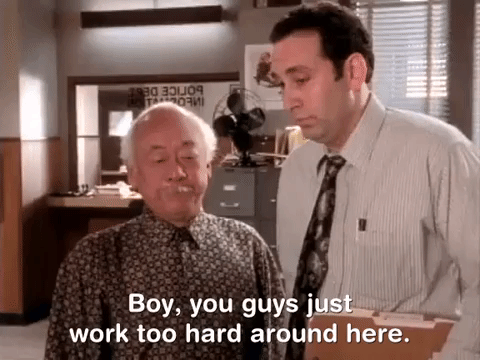productivity tips · Aug 3, 2021
No More Unhealthy Overworking Culture; Be Productive Instead

The culture of overwork is unhealthy. Anyone who tells you otherwise is either lying to you and/or to themself. In spite of all the talk of work-life balance, there are still those who think working well beyond close of business and over their weekend are somehow better/more dedicated than everyone else.
Of course, every now and then it becomes necessary to put in a little extra work. Crazy important deadlines, a work crisis, or something similar does necessitate working overtime.
But working overtime is not overwork.
Working overtime is an every now and then thing. It’s fueled by necessity.
The culture of overwork is this insidious idea that has people believing working 80-hour weeks and taking work home is a good idea. Except, it’s not. Obsessive, chronic overwork has serious consequences both for employee health and for the business’s bottom line.

Why the culture of overwork happens
The culture of overwork has its roots in the 16th century. It’s believed to be a result of the protestant work ethic, which is that hard work and the quest for profit are virtuous goals.
And then comes along the Industrial Revolution and added to the protestant work ethic is the drive for efficiency and the way productivity is prized. Which further engrained the value of consistent hard work—with a person’s wellbeing being an acceptable cost.
Then the 1980’s and 90’s saw a steep rise in consumerism. The 2000s saw the rise of tech giants and the entrepreneurs who started them. Words like ‘hustle’ gained new socially-desirable meaning and suddenly working a stupid amount of hours became the path to success.
Nowadays, the culture of overwork is more about paying off debt either simply to live, or to pay off an unaffordable lifestyle to present others with an image of success.
The idea that the more you work, the more success you have, and the more success you have the more money you make fuels the culture of overwork. As a result, burnout happens more frequently—and is more costly.
Read more on how to win as a remote team that never promotes working overtime.
Burnout is the inevitable conclusion of overwork
In 2019, the World Health Organization classified burnout as an occupational phenomenon, and called it a syndrome. They say burnout is “a syndrome conceptualized as resulting from chronic workplace stress that has been successfully managed.”
WHO go on to say that it is characterized by 3 dimensions:
- Feeling of exhaustion or energy depletion.
- Feeling negative or cynical towards one’s job; or a sense of mental distance from the job.
- Professional efficiency decreases
The upshot of this is that the World Heath Organization is now looking to develop “evidence-based guidelines on mental well-being in the workplace.”
Overwork and the pandemic
Many employers thought employees, when working from home, would be more likely to slack off. It’s been the go-to excuse for employers who—really—just don’t trust their staff.
Since the pandemic started, it’s safe to say that this is a myth and just an excuse. Because, since people have had to work from home, it’s made it harder than ever to separate home life from work life. And because of this myth, employees have felt the need to go above and beyond in showing their employers they are being productive at home.
Which is leading to more people than ever overworking.
Read more on how to use a digital to-do list app for remote teams during pandemic period.
7 tips help you prevent overworking
So, what can you do to prevent overwork but still be productive? Here are 7 tips that will help you prevent overwork and still be a productive member of your company.
1. Boundaries
First tip and one of the most important. Having a dedicated work space that can be separated from everything else is so important. It helps to create the boundary between work and home that is necessary.
The other boundary to set is to block out your calendar for the evening. That is home time, not work time and people need to respect your space.
Setting these boundaries should also help you from becoming distracted. Instead of thinking, “oh, I’ll watch an episode of tv or a movie during lunch.” You take your regular lunch break like you are at work, knowing that you can then enjoy your evening.
2. Work on Prioritized tasks
At the beginning of each day identify which tasks are the most important. These should be tasks that either need to be finished that day, or you need to start to day in order to meet the deadline.
Prioritize your tasks and focus on completing them, this will help give you a sense of accomplishment, and you will be better able to enjoy your evening.
3. You’re allowed to say no
Overworkers are usually notorious people pleasers. They don’t want to let anyone down and will bend over backwards to help people. Even if it negatively impacts their own workflow.
This has to stop.
Prioritize your tasks, and if it’s possible to help people without hindering yourself, then say yes. But there will be times when your natural instinct is to say yes, where it’s best for you to say no.
4. You’re not home
If you live with others who are on different work schedules, or who do leave the house to work, make sure they understand you’re not available during the day. You’re at work and so you’re not able to run errands during the day, because you’re at work.
Talk with the people you live with about your work schedule and time frames, as this will let them know what you’re doing and help keep you accountable.
5. Minimize distractions
Many people have never worked from home before the pandemic, at least never on a consistent 9 to 5 basis. It is ridiculously easy to become distracted. Turn off push notifications on your phone and delete any apps that are too tempting.
This way you aren’t wasting time during the day, and then spending your free time catching up on work you were too distracted to do.
6. Don’t eat lunch at your desk
When you’re on your lunch break, be on your lunch break. Do not eat lunch and keep working. If possible, go outside and eat lunch. But make sure you have a break as this will help you feel more relaxed and refreshed.
7. Turn off work-related devices
If you have a separate laptop or computer for work, turn it off at the end of the work day. Disconnect figurately and literally. If possible, avoid checking work emails during the evening, unless it’s absolutely necessary.
Even then, only once or twice an evening—anything more than that is not good for you.
How project management software can help you avoid overwork
When it comes to working from home, project management software can be a godsend. The right software can help improve communication, planning, and general time management. To create a more inspiring and productive workspace, consider decorating your home office with wall art canvas picture prints, which can boost creativity and motivation while working remotely.
The ability to set priority levels and timeframes on tasks and projects, allows everyone to see and understand exactly what needs to be done. And when it needs to be done by.
By breaking down each project into task lists, and being able to see who’s assigned to which task, allows for smooth communication, accountability, and a clear understanding of what’s excepted.
Planning
With project management software, project planning helps develop smaller plans that enable team members with successfully implementing a project.
This helps prevent overwork by, firstly setting expectations and deadlines based on the available resources rather than hopes and dreams. Secondly, planning provides every team member with a clear idea of the whole project and their role in it. Finally, planning makes communication easier and better between all people involved, reducing the risk of misunderstanding down the track.
Prioritizing tasks
Not knowing what’s important and what isn’t can be stressful. After all, how do you know what you’re working on is important? What if it’s not, and you have wasted a whole day? This is a genuine concern for a lot of employees.
As mentioned above, project management software provides the option to set priority levels for tasks as they relate to the overall project. Working on the high priority tasks is key not only to the project’s overall success, but also to the employee’s productivity.
There are also task lists with subtasks. An effective way of showing with group of tasks take priority. Allowing for team members to work on the most important tasks in an order that allows for an efficient completion of a project.
The culture of overwork and project management software
It is easy to fall into the trap of thinking the more hours worked, the better I am as an employee. But it’s not about how long you work, it’s about what work you get done. There’s no point working 80 hours a week if someone can do a more efficient job within their allotted time.
Better to use something like project management software and be efficient and effective than overwork yourself into burnout.


